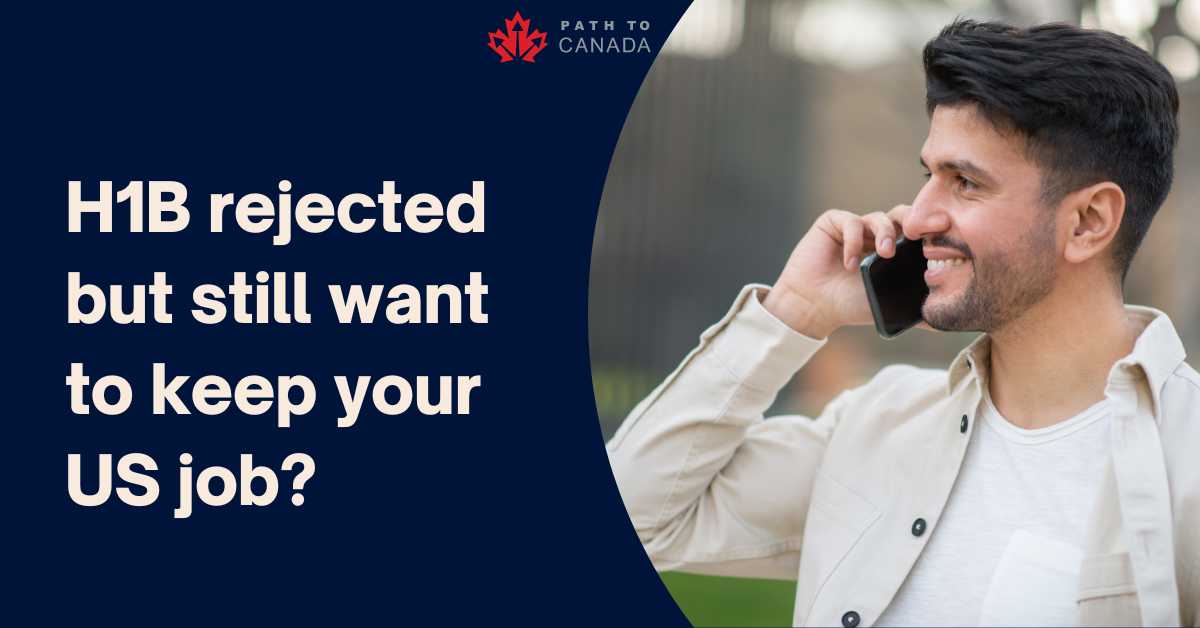The H1B visa program has long been the primary gateway for skilled foreign professionals seeking employment authorization and opportunities in the US. This non-immigrant visa category allows American companies to temporarily employ foreign workers in specialty occupations, providing a crucial pathway for industries seeking foreign expertise.
However, the high demand for H1B visas often exceeds the annual cap set by the US government, resulting in a competitive lottery system that leaves many qualified individuals without the chance to work in the country. For those not selected in the H1B visa lottery, exploring alternative visa options becomes essential to pursue their professional goals and establish stability.
In this comprehensive guide, we’ll dive into the various alternatives to the H1B visa, offering a thorough understanding of the available choices so you can find one that suits your situation. Whether you’re an experienced professional, a recent graduate, or an individual with exceptional abilities, this guide will equip you with the knowledge and resources necessary to make informed decisions about your US immigration journey. Let’s dive in.
What does “alternatives to H1B visa” mean?
H1B alternatives if not selected in the lottery are important pathways that allow foreign nationals to work legally in the United States. These alternatives may offer different eligibility criteria, application processes, and potential benefits compared to the H1B visa. Each visa type has its own set of requirements and limitations, so it’s important to carefully evaluate your specific situation and goals before pursuing any alternative.
Why do you need an alternative to the H1B visa?
The primary reason for seeking alternatives to the H1B visa is the highly competitive nature of the lottery system. Each year, the demand for H1B visas far exceeds the annual cap set by the US government, leaving many qualified individuals without the opportunity to work in the US. Some people may not meet the specific criteria for the H1B visa or may have unique circumstances that make other visa options more suitable.
Beyond the lottery constraints, there are several other reasons why individuals may need to explore H1B visa alternatives:
1) Unique career paths or specializations: Some professions or specialized fields may not align perfectly with the visa requirements. In this case, alternatives to the H1B may be better suited to the individual’s specific circumstances.
2) Employer preferences: Certain US employers, particularly those in niche industries or with specific business needs, may favor sponsoring employees through alternative visa categories that better align with their organizational goals or hiring strategies.
3) Long-term immigration goals: For individuals seeking permanent residency or a pathway to citizenship in the US or elsewhere, alternative visa options may offer more favorable routes or timelines than the nonimmigrant H1B visa.
4) Personal circumstances: Family situations, existing immigration status, or other personal factors may influence the decision to pursue alternative visa options that better accommodate individual needs or constraints.
5) Desire for career mobility: Some H1B visa alternatives may provide greater flexibility and freedom in terms of job mobility or the ability to change employers, which can be advantageous for individuals seeking career growth or exploring multiple opportunities.
Regardless of the specific reasons, it makes sense for foreign professionals to explore other immigration pathways, as many may actually be better options for them in the long run.
How the H1-B visa lottery works
The H1B visa is subject to an annual cap, currently set at 85,000 for the fiscal year (65,000 for the general cap and an additional 20,000 for individuals with a US master’s degree or higher). When the number of petitions received exceeds the cap, the US Citizenship and Immigration Services (USCIS) conducts a computer-generated random selection process, commonly known as the H1B lottery.
During the lottery process, USCIS will first select petitions for individuals with a US master’s degree or higher to fill the 20,000 advanced degree exemption quota. The remaining petitions are added to the general cap pool if the advanced degree quota is unmet. USCIS then randomly selects petitions from the general cap pool to reach the 65,000 cap limit. Petitions not selected in the lottery are rejected
The H1B visa lottery has become increasingly competitive and challenging in recent years, with the demand for these visas far outstripping the available supply. In the fiscal year 2024, USCIS received 780,884 H1B registrations, a staggering number compared to the 85,000 visas available. This means that only around 14.6% of the petitions were selected in the lottery. As the competition for H1B visas intensifies, exploring alternative visa options has become increasingly important.
What to do if you’re not selected for the H1B visa?
It’s understandably stressful if you’re not selected for the H1B visa lottery, but there are other immigration pathways available—some of them can be much better options long-term! The H1B doesn’t secure permanent residency in the US or lead to citizenship, and it can be a long, drawn-out process compared to the faster processing times of some of the other options available.
Here are some other avenues to consider or work towards if you don’t qualify right now.
L1 visa
The L1 visa is an intra-company transfer visa that allows multinational companies to transfer their senior employees from their foreign offices to their US operations. There are two types of L1 visas: L1A for executives, managers, and individuals with specialized knowledge, and L1B for employees with specialized knowledge in their field.
To qualify for an L1 visa, you must have worked for the company for at least one continuous year within the three years before the transfer. You also have to meet the specific criteria related to your job duties, qualifications, and the nature of the company’s operations in your home country and the US.
The application process for an L1 visa typically involves submitting a petition to the USCIS with supporting documentation, such as evidence of your employment history, job duties, and the company’s qualifications as a multinational organization.
If you work for a company that qualifies, this can be a simpler option than trying for the H1B. It has faster processing times, there’s no annual cap or lottery system, and L1 visa holders can work towards obtaining US permanent residency (a green card). Your children and spouse can also join you and obtain work authorization.
CAP exempt H1B employers
Certain employers are exempt from the H1B cap, meaning they can sponsor H1B visas without being subject to the annual quota. These employers include institutions of higher education, non-profit organizations affiliated with institutions of higher education, non-profit research organizations, and government research organizations that meet the minimum wage requirement of $60,000 per calendar year.
This route is typically much quicker than the standard H1B process, making it an ideal option if your work for a cap exempt employer. However, while it is more likely that your employer will be able to secure you an H1B, it doesn’t guarantee it.
If you’re considering employment with a cap-exempt H1B employer, it’s important to understand their specific requirements and application processes, as they may vary from the standard H1B visa process. It can be difficult to find jobs that are H1B CAP exempt as they aren’t typically listed, but researching potential employers can be a great first step if you work in a relevant field.
Intra-company transfer
Similar to the L1 visa, an intra-company transfer can be an option for individuals currently employed by a multinational company with operations in the US. This process allows you to transfer from your company’s foreign office to its US office, potentially bypassing the H1B visa lottery.
This option may involve applying for a different visa category, such as the H1B visa (if the company has cap-exempt status or has petitions available outside the annual cap) or the E2 visa category for treaty traders and investors.
It’s important to note that the requirements for an intra-company transfer may vary depending on the specific company and its policies. Consulting with an immigration attorney or your company’s human resources department can provide you with guidance on the feasibility and process of pursuing this option.
EB1/O1 visa
The EB1 and O1 visas are employment-based visa categories that cater to individuals with exceptional abilities or extraordinary achievements in their respective fields. It’s divided into three subcategories: EB1-A for individuals with extraordinary abilities in sciences, arts, education, business, or athletics; EB1-B for outstanding researchers and professors; and EB1-C for multinational executives and managers.
The O1 visa, on the other hand, is designed for individuals with extraordinary abilities in the fields of science, arts, education, business, or athletics or those who have demonstrated extraordinary achievements.
While these visa categories have stringent eligibility criteria and may require extensive documentation and evidence of exceptional abilities or achievements — such as newspaper articles and awards — they can be viable options for highly skilled and accomplished individuals who meet the requirements.
Because many lines of work qualify for this option, it is recommended that you discuss your options with a professional. They will also be able to advise you on what you need to qualify for in the future so you can build up your resume to apply in the future if you’re unable to do so right now.
Day 1 CPT
The CPT (Curricular Practical Training program) can provide an alternative pathway to gain practical work experience for F-1 student visa holders. Day 1 CPT, in particular, allows eligible students to begin working for an employer on the first day of their academic program.
To qualify for Day 1 CPT, students must enroll in a qualifying academic program at a participating institution that offers this option. It’s important to consult with the international student office at your college or university to understand the specific requirements and application processes.
While Day 1 CPT may not provide a direct path to long-term employment in the US, it can offer valuable work experience and potentially lead to other opportunities, such as securing a job offer from the CPT employer or pursuing alternative visa options.
Keep your US job and work from Canada
For those who are not selected in the H1B visa lottery but have secured a job offer from a US company, one alternative is to work remotely from Canada. This option involves obtaining a work visa from Canada that allows you to live and work in the country while working for a US company. This is usually done via Canada’s Global Talent Stream, which offers a fast-track immigration pathway for skilled professionals.
This could be an ideal solution if you work for a company that is open to having employees remotely working from Canada. They don’t even need an office there to make it work, as many US companies partner with Professional Employer Organizations (PEO) to handle the logistics of remote employment, including payroll, tax, HR, and compliance.
This option can also lead to many personal and professional benefits. People who qualify for a Canadian work permit can typically apply for permanent residency and Canadian citizenship within three years. Once someone has citizenship, other immigration options can open up, including trying the H1B pathway again as a Canadian.
H1B visa alternatives exist, get in touch to discuss your options
The path to working in the US is not a one-size-fits-all journey. While the H1B visa remains a popular option, the realities of the lottery system and annual caps mean many skilled individuals must explore H1B visa alternatives. While each carries unique requirements, all of them provide potential avenues to work for an American employer, whether in the US or Canada.
Check your eligibility to Move your US Job to Canada Here!

